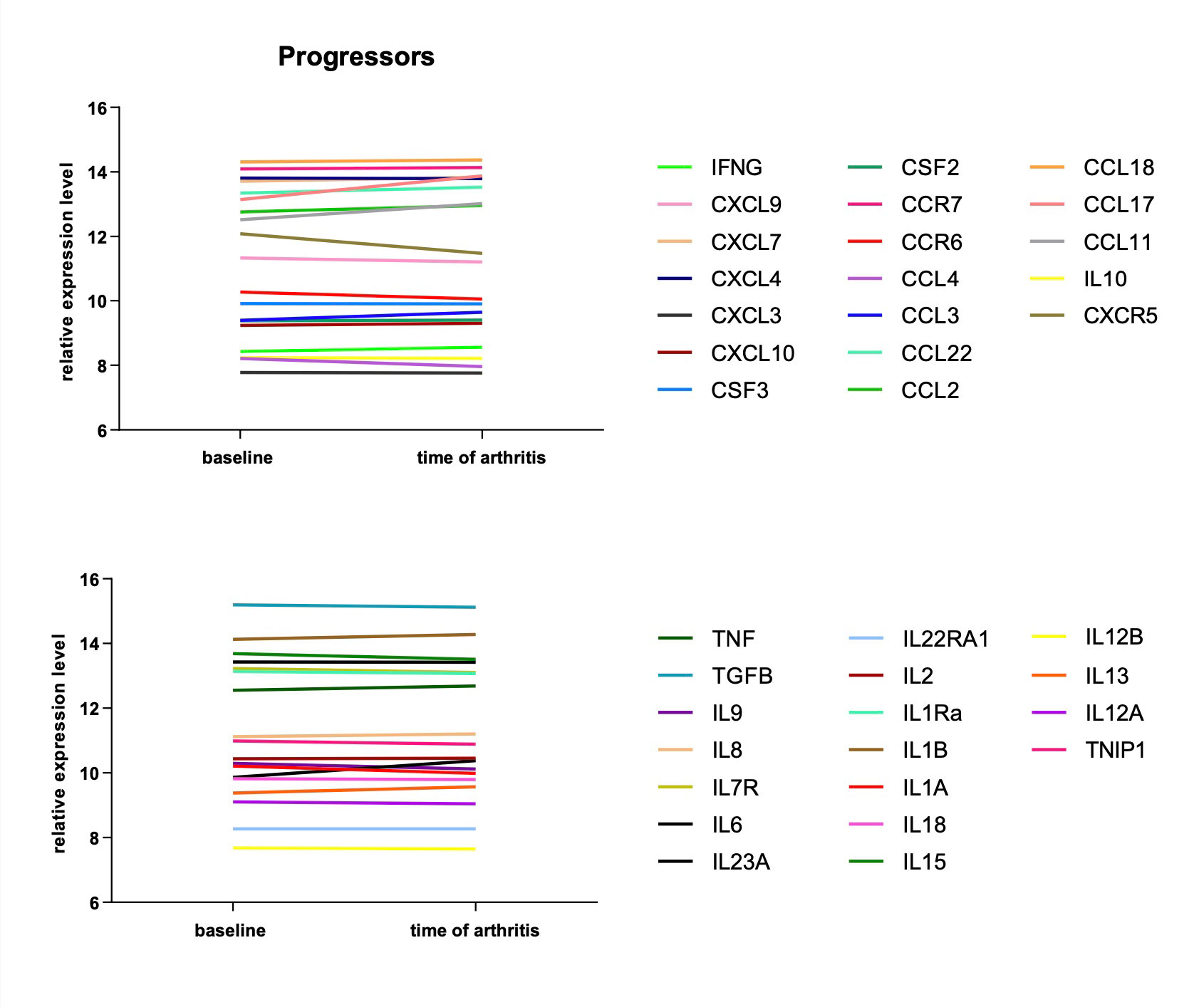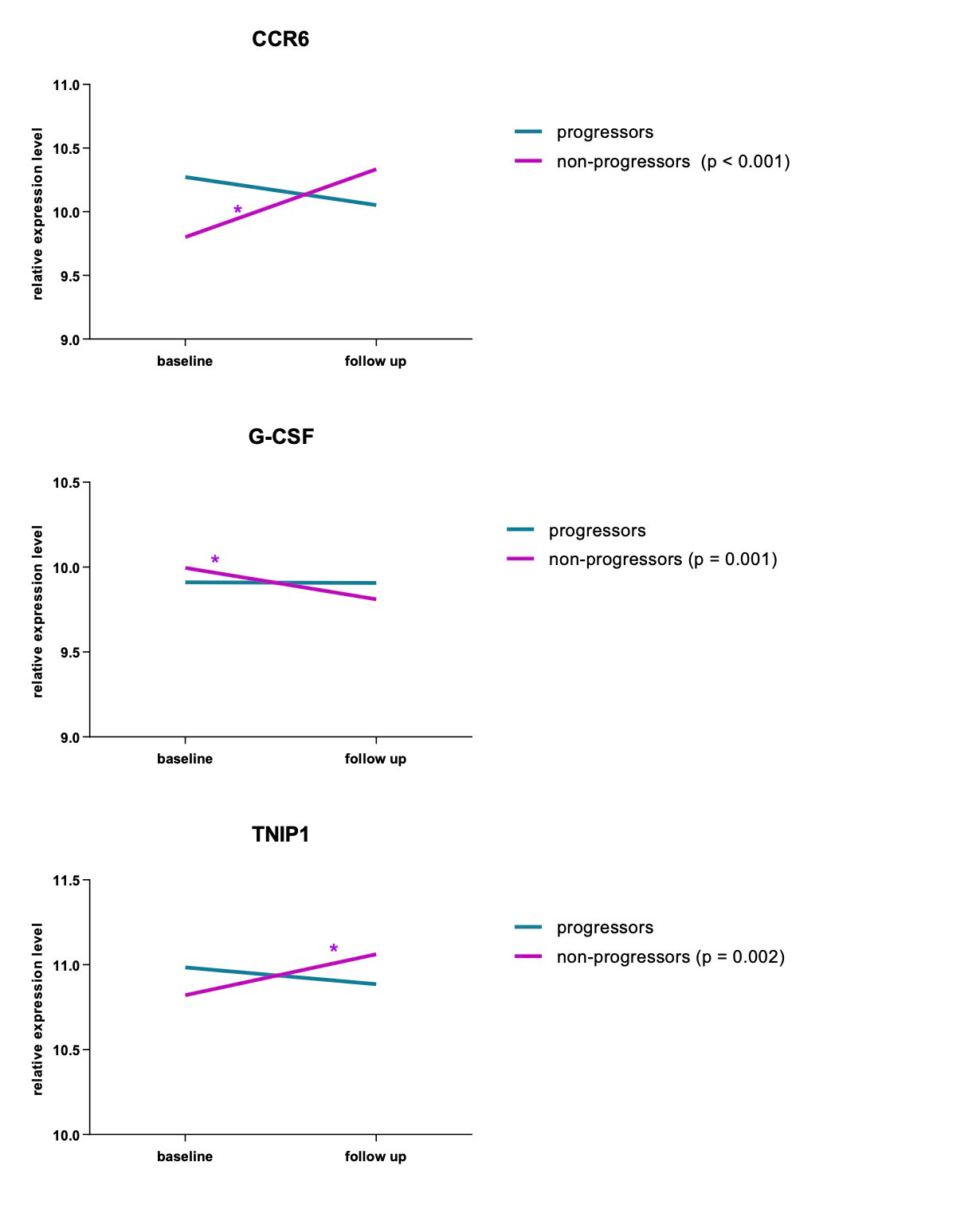Session Information
Session Type: Poster Session A
Session Time: 1:00PM-3:00PM
Background/Purpose: Autoantibody responses rise years before onset of inflammatory arthritis (IA) and are stable during transitioning from clinically suspect arthralgia (CSA) to IA (1). Cytokine and chemokine levels can also rise years before IA-onset, whilst CSA generally develops 6-12 months prior to IA-onset (2). Since the course of cytokines/chemokines in CSA is unknown, we studied the course of cytokine and chemokine gene expression in CSA-patients during progression to IA, and in CSA-patients who ultimately did not develop IA. Differential expressed genes between ACPA-positive and ACPA-negative CSA patients who developed IA were explored.
Methods: Whole blood RNA expression of 37 candidate inflammatory cytokines and chemokines was determined by dual-color reverse-transcription multiplex ligation-dependent probe amplification (dcRT-MLPA), in paired samples of CSA-patients at CSA-onset and either at IA-development or after 24-months without progression. ACPA-positive and ACPA-negative CSA-patients developing IA were compared at CSA-onset and during progression. GEE-models tested changes over time. A false discovery rate approach was applied to correct for multiple testing.
Results: In CSA-patients who progressed to IA, gene expression of none of the cytokines and chemokines significantly changed between CSA-onset and IA-development (Figure 1). In CSA-patients who did not progress to IA, G-CSF expression decreased (p=0.001) and CCR6 and TNIP expression increased (p< 0.001 and p=0.002, respectively) in 2-years (Figure 2). Gene expression levels in ACPA-positive and ACPA-negative CSA-patients who developed IA were similar.
Conclusion: Whole blood cytokine and chemokine gene expression did not change significantly over time from CSA to IA-development. This suggests that changes in systemic expression occurred preceding CSA-onset and may not relate to the final hit of developing chronic disease. Observed changes in CSA patients not developing IA can provide clues for processes related to resolution.
References
1. Wouters F et al. Ann Rheum Dis. 2020;80(4):540-2
2. Sokolove J et al. PLos One 2012;7(5):e35296
To cite this abstract in AMA style:
Heutz J, Rogier C, Niemantsverdriet E, van den Eeden S, de Jong P, Geluk A, van der Helm-van Mil A. Expression of Cytokine and Chemokine Genes in Patients with Clinically Suspect Arthralgia; A Longitudinal Study During Progression to Inflammatory Arthritis or Non-Progression [abstract]. Arthritis Rheumatol. 2022; 74 (suppl 9). https://acrabstracts.org/abstract/expression-of-cytokine-and-chemokine-genes-in-patients-with-clinically-suspect-arthralgia-a-longitudinal-study-during-progression-to-inflammatory-arthritis-or-non-progression/. Accessed .« Back to ACR Convergence 2022
ACR Meeting Abstracts - https://acrabstracts.org/abstract/expression-of-cytokine-and-chemokine-genes-in-patients-with-clinically-suspect-arthralgia-a-longitudinal-study-during-progression-to-inflammatory-arthritis-or-non-progression/


